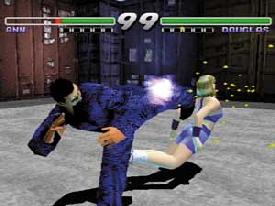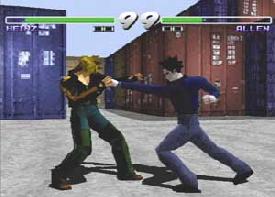Nothing is Sacred.
This is especially true in the world of video gaming, where great ideas are borrowed,
distorted or outright stolen to help turn a profit. The masterpieces of gaming
inevitably lead to a slew of small-minded rip-offs that serve little more than
to help stock the shelves and perhaps sucker the unsuspecting consumer into thinking
it was a different game. Can you spell Tomb
Raider 3?
Konami’s fighter Kensei: Sacred Fist is about as original as a UPN sitcom (or a Hasbro Interactive game…take your pick). Though the action is decent, the game is about as unspectacular as they come.
Let me stress here
that this is not Tekken 4, though the designers would like you to believe
so. The game menus, graphics, character design, and interface are a blatant
rip-off of Tekken
3. Of course, none of these elements are done nearly as well. Kensei
is Tekken on welfare.
Oddly, there is no discernable plot in Kensei. While normally I think
that fighting game plots are useless and mundane, I found myself wishing for
something – anything – to tie the characters together. But alas, there is no
FMV (aside from a very brief intro) to flesh out the character bios or overall
story. There is no background in the manual to set the stage. We have no idea
why these people are fighting or what they are fighting for. Guess they just
needed to blow off some steam.
The design of the characters is very bland. One guy is the karate master,
this girl is the drunken master, some other guy is the pro wrestler, blah, blah,
blah. Almost exactly like all the Tekken fighters. There are absolutely
no surprises here. I’m saddened that the developers didn’t spend a bit more
time on this area. It seems that they just didn’t want to think very hard or
use their imagination. Too bad.
Graphically, the game isn’t bad. The characters have a high polygon count and are textured seamlessly. You’ll find very smooth looking fighters. The high frame rate (60 fps) is also quite nice. However, the collision detection is pretty bad. More than a few times I lost/won by punching thin air. This is inexcusable in a fighting game, which is all about collision.
There are a couple of ways to play, including normal mode, survival mode,
vs. mode, and the pointless ‘watch’ mode, where you watch the PlayStation beat
itself up. You can choose from 9 starting fighters, though you can eventually
open up 13 more. Like in Tekken 3, each standard fighter has an alternate bonus
character. Unfortunately, there isn’t much difference between the standard characters
and the extra ones, aside from a few moves.
Speaking of moves, Kensei again borrows heavily from Tekken 3 with
the assortment of kicks, punches and combos specific to each fighter. The ninja
Hyoma’s wheel kick looks exactly like Law’s from Tekken. Heinz (the misunderstood
German) fights eerily like Tekken‘s Germanic biker Paul. The move sets
are just completely uninteresting and unoriginal.
 The general gameplay
The general gameplay
is fine. Fans of fighting games will find that this pretty much fits the bill,
albeit a bit bland. You can sit down and play Kensei with a friend and
be adequately entertained.
Playing solo in any fighting game is rarely as fun as fighting friends, but
in Kensei it takes on a whole new level of tedium. There is absolutley
no FMV reward for beating the game. You don’t get to see some sort of cool cut-scene.
You don’t get to discover what happens to your fighter after winning. You don’t
get squat, aside from the *yawn* list of credits, and opening up yet another
dull bonus character. This is just lame – any fighting game fan will tell you
that if they beat the game, they want to see something interesting.
In all fairness, Kensei does do a few cool things. For one, blocking
is transformed graphically into a series of dodges and evasions. You don’t just
stand there holding your hands up and mysteriously avoiding damage. This leads
to a very cool and realistic looking fight, sort of like watching a choreographed
sequence from a kung-fu flick.
Additionally, Kensei employs a reversal system. Most characters have
some sort of move that, when timed correctly, will ‘catch’ an opponent’s strike
in mid-motion and reverse it. This comes in handy and leads to some pretty nice
comebacks.
But even these two minor innovations are not enough to raise Kensei
above mediocrity. It’s astounding to me that games like this are still made,
particularly by a company like Konami, who is responsible for the groundbreaking
Metal
Gear Solid. Kensei is a weekend rental at best.
-
Decent action
-
Nice graphics









